
Nutritionists are responsible for the development and adjustment of dietary protocols specific to each client’s starting point and goals. With the proper tools, these specialists can educate clients to identify achievable goals and increase their success by tracking progress throughout their programs. The InBody Result Sheet provides nutritionists and dietitians with the information needed to effectively understand and empower each of their clients to succeed.
InBody devices are non-invasive and convenient, making it the ideal tool to implement into nutrition programs for body composition analysis. The InBody Test provides comprehensive results that can be used to track and educate clients on body fat and health risk as well as understand the differences in diet consumption effects.
In less than 60 seconds, the InBody test provides easy-to-understand, accurate and objective measurements to evaluate a client’s current body composition as well as monitor the success of dietary interventions. Nutritionists can use the InBody to:
Below are examples of the different types of clients nutritionists and dietitians will encounter and how the InBody results sheets can be implemented into practice, creating success for all clients with different needs and goals.
“Minimizing lean mass loss is an important health and safety consideration to maintain strength, physical function and maximize basal metabolic rate for long-term weight maintenance.”
“Body composition analysis through bioelectrical impedance can act not only as a guidance for adequate lifestyle counseling (focused on PA, diet or both), but also as a prior assessment of overall metabolic risk in overweight adolescents.”
“Monitoring body composition regularly helps to personalize nutritional plans and reduce the risk of malnutrition and sarcopenia, resulting in a better quality of life for our patients.”

For clients looking to build muscle mass, a proper dietary program is required to optimize results and ensure weight gain occurs in the form of muscle mass. Using BIA technology the Muscle-Fat Analysis section offers nutritionists and dietitians a better way to monitor the progress of their client’s program and allow for earlier dietary interventions to optimize their success.
While research supports the use of protein in addition to resistance training to increase skeletal muscle mass, a proper macronutrient balance is required to avoid plateaus and ensure that weight gain occurs in the form of muscle mass and not fat mass. Clients can monitor the effectiveness of their dietary regime or supplements, which ultimately provides credibility to the nutritionist’s recommendation and programming.
As lean mass is increasing, positive effects are happening with client’s Basal Metabolic Rate. InBody provides an accurate representation of Basal Metabolic Rate (BMR) that is based on a client’s amount of lean body mass. Educating clients on the relationship between lean mass and BMR can increase motivation and adherence to dietary programming, ensuring long-term client success.
InBody’s Body Composition History tracks a client’s progress throughout their program and ensures their BMR and nutrition program are balanced to reflect their muscle growth. By monitoring weight, skeletal muscle mass, and percent body fat, clients will be able to track and maintain their ideal body composition.
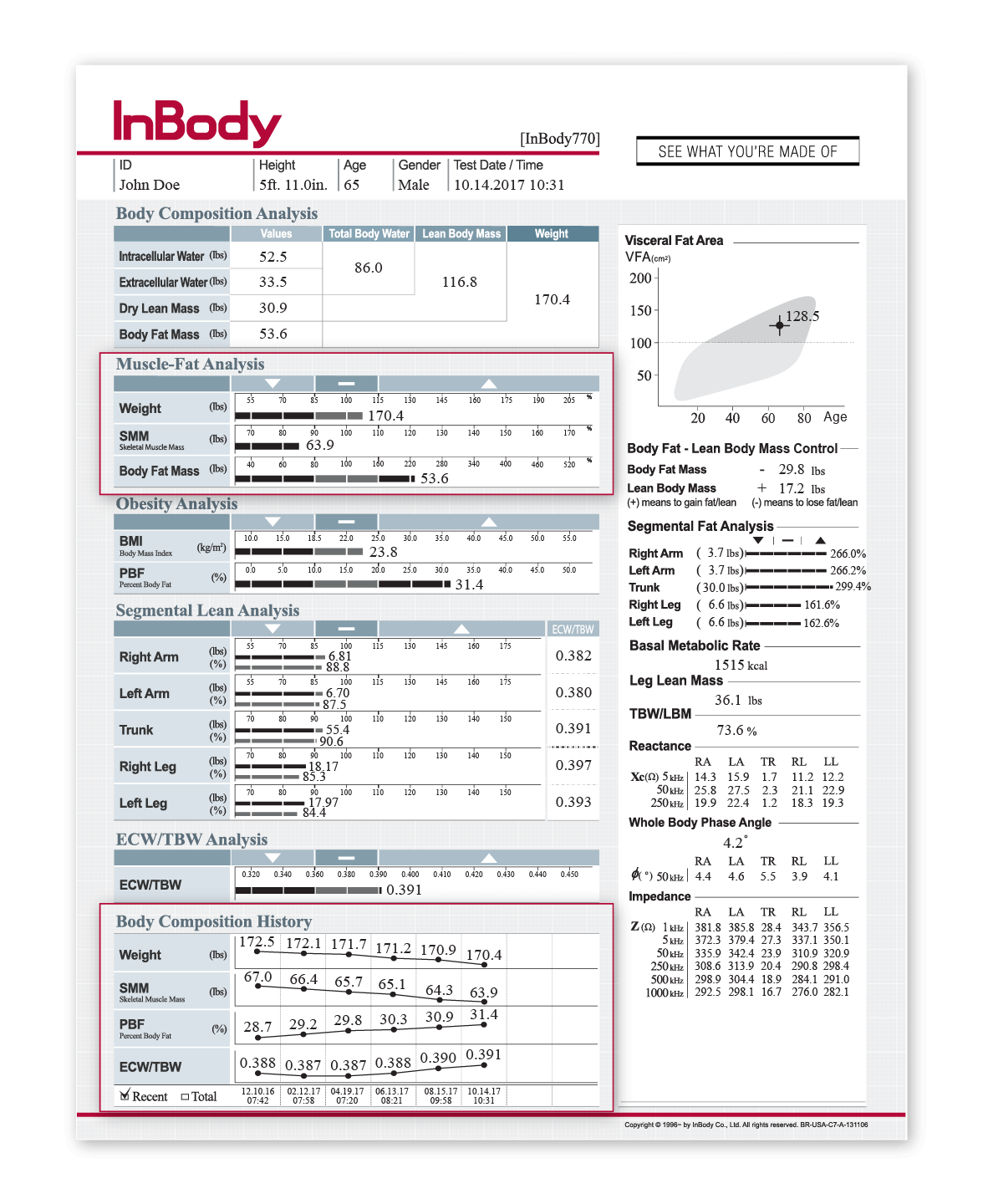

Numerous studies support the correlation between overweight/obesity and the risk of developing cardiovascular disease, metabolic syndrome, diabetes and even certain cancers. Weight loss, specifically through calorie restriction can help decrease both percent body fat and metabolically harmful visceral fat. Through measurements on the InBody, nutritionists will be able to diagnose the degree of obesity to set effective weight loss goals.
Relying on BMI to track changes in body composition is limited due to its inability to identify if losses are due to changes in fat or lean mass. InBody allows nutritionists to measure body composition and track where weight loss is coming from, in a convenient, timely manner.
Visual representation of health risks can be hard to portray to clients. InBody Result Sheets provide a visual representation of a client’s balance between muscle and fat, helping nutritionists show clients their overall health risk based on their current body composition. This in-depth assessment allows dietitians to set effective weight loss goals and is a powerful tool for tracking progress to ensure proper improvement is being made. As weight is lost, tracking which compartment the loss is coming from, i.e fat mass instead of lean mass, improves client health and lowers future health risks.
When using indirect calculations, developing nutritional programs based on a client’s unique caloric needs can be difficult. InBody’s Basal Metabolic Rate (BMR) is a more accurate representation of caloric need that is based on lean body mass. Using BMR, nutritionists will be able to establish detailed programs aimed specifically at a client’s goal of optimizing fat loss while maintaining muscle mass.
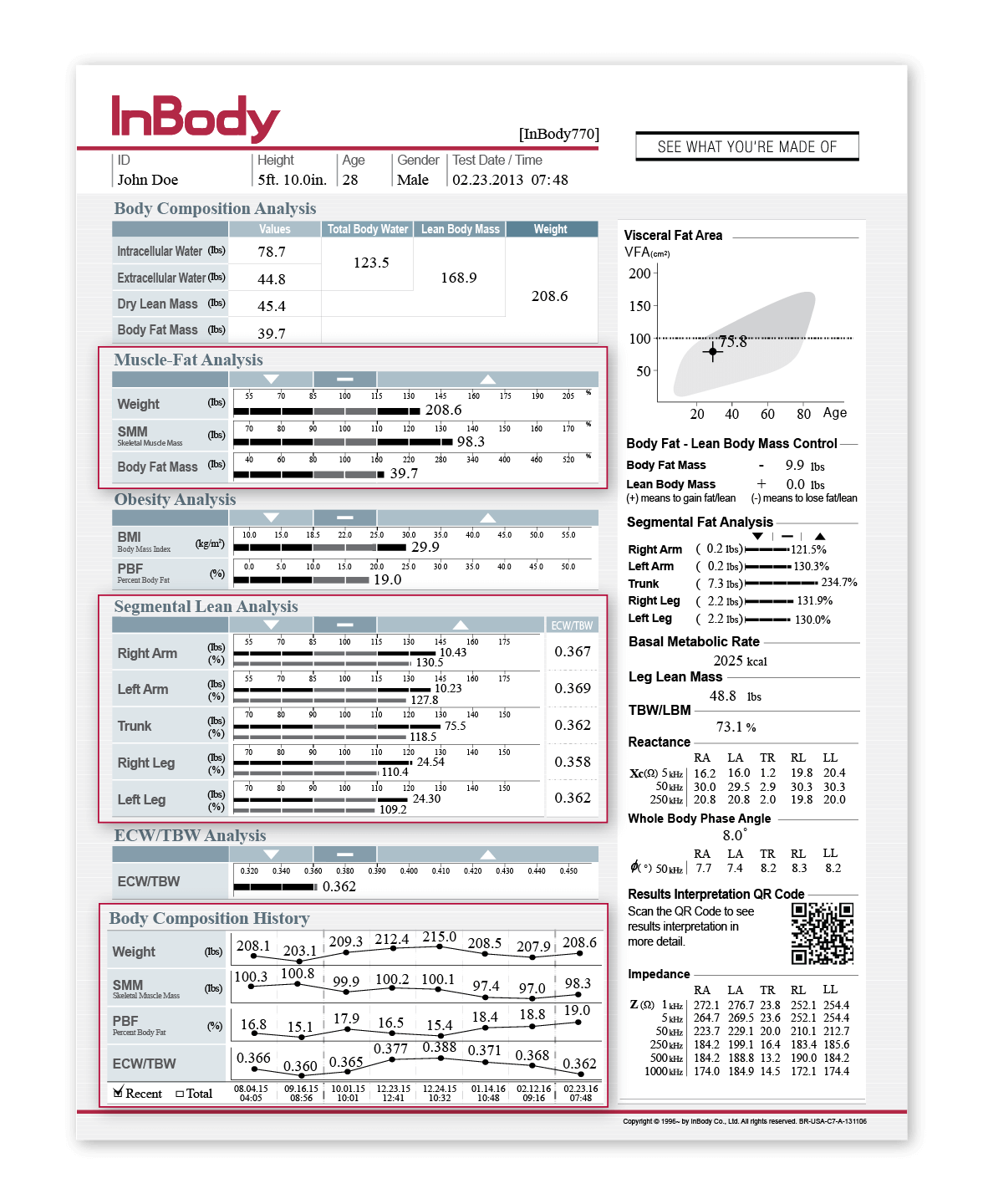
When guiding elderly clients in nutritional programs, diets must be coordinated to support muscle maintenance or growth reduce the risk of muscle loss and frailty. Additionally, lower physical activity and poor dietary patterns can lead to the development of excess fat mass, increasing the risk of disease. By monitoring body composition, dietitians can design nutrition programs set to maximize muscle maintenance and growth. Through the use of the Muscle-Fat Analysis, nutritionists can monitor a client’s muscle and fat balance with ease and track any changes between the two compartments over a prolonged period.
A primary challenge most elderly patients face is the development of fat mass, occurring from a decrease in physical activity and less nutritious diet, paired with muscle loss. This simultaneous change can mask health risk as a patient’s weight may not always display the change between muscle and fat taking place under the surface. As lean body mass decreases, elderly patients become more at risk for developing sarcopenia. This detrimental loss of muscle decreases activity, increasing the likelihood of visceral fat storage and drives up risk for diabetes, CVD and frailty. Tracking body composition changes with the Body Composition History graph over time allows dietitians to detect muscle loss and fat gain earlier, leading to faster intervention and reduction of sarcopenia, frailty and injury.
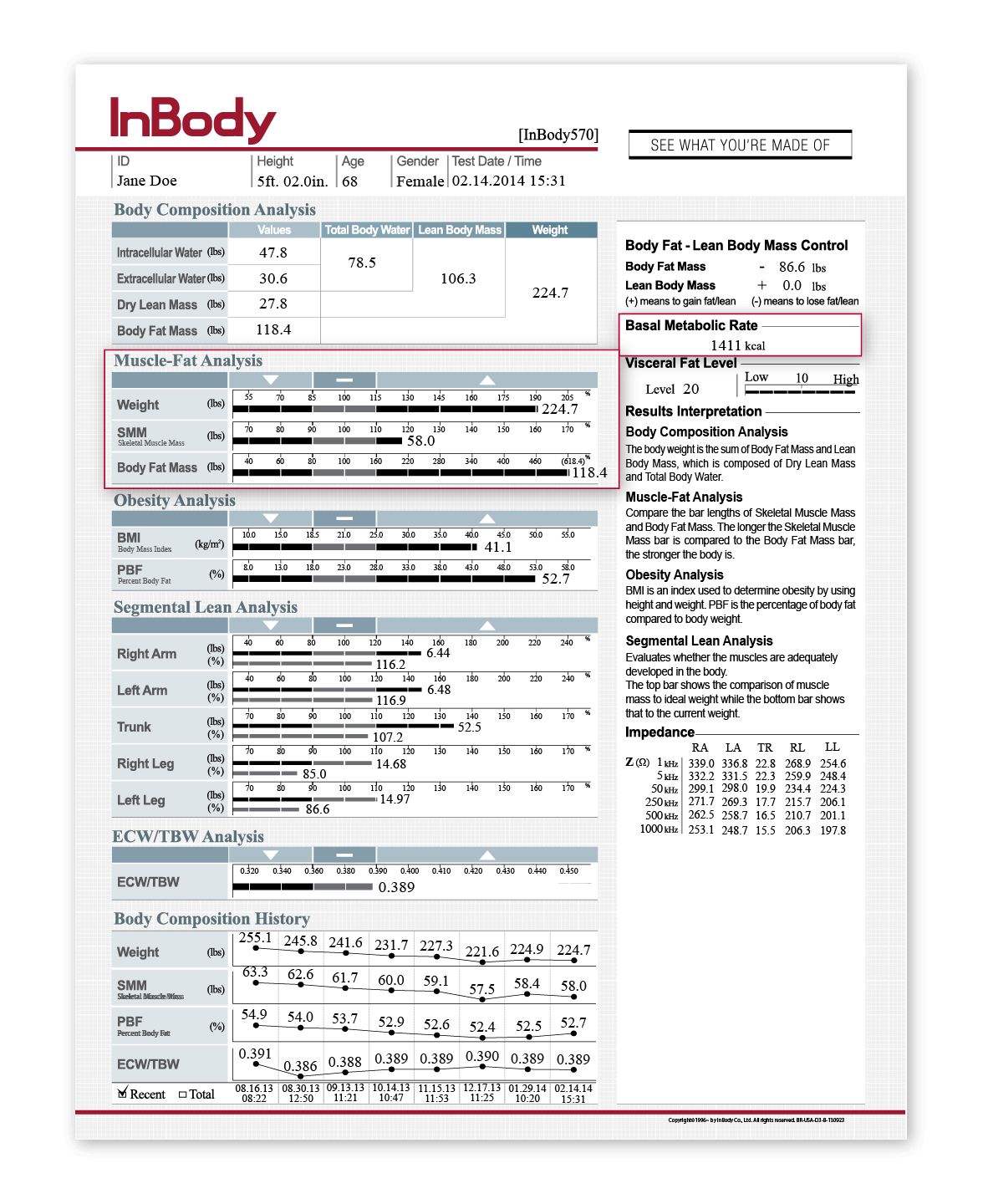

Programming for athletic populations takes careful consideration of sports type, time of the season, and desired outcomes. InBody allows dietitians to test athletes more frequently to monitor changes from their dietary recommendations. The Muscle-Fat Analysis portrays the amount of skeletal muscle mass and body fat mass, ensuring a proper balance for athletes especially throughout different times of the season.
Understanding changes in Segmental Lean Analysis, dietitians can signify the need for changes to nutrition as well as training programs. Monitoring any changes in lean mass can mean an adjustment needs to be made to prevent decreases in performance. Additionally, measures of body water can signify changes in hydration status that may require more precise management of fluid intake. By testing every few weeks dietitians will be able to detect negative changes quicker and address them sooner, increasing performance and success.
When injuries occur, nutritional changes are required based on changes to physical activity levels. Setting a nutrition plan to promote optimal recovery can prevent the negative changes associated with detraining and decreased activity during the recovery period. Tracking these changes frequently throughout the rehabilitation program can help dietitians understand these changes more appropriately and further support athlete recovery.
The frequency of testing is a key component when watching for small changes in body composition, especially in the athletic population where changes can influence performance and sport in a big way. While traditional body composition methods do not provide the ability to regularly track nutritional, training, fluid parameters, InBody’s Body Composition History charts weight, skeletal muscle mass, percent body fat, and ECW/TBW, allowing for dietitians to monitor these variables to identify any changes that might impact athlete performance.
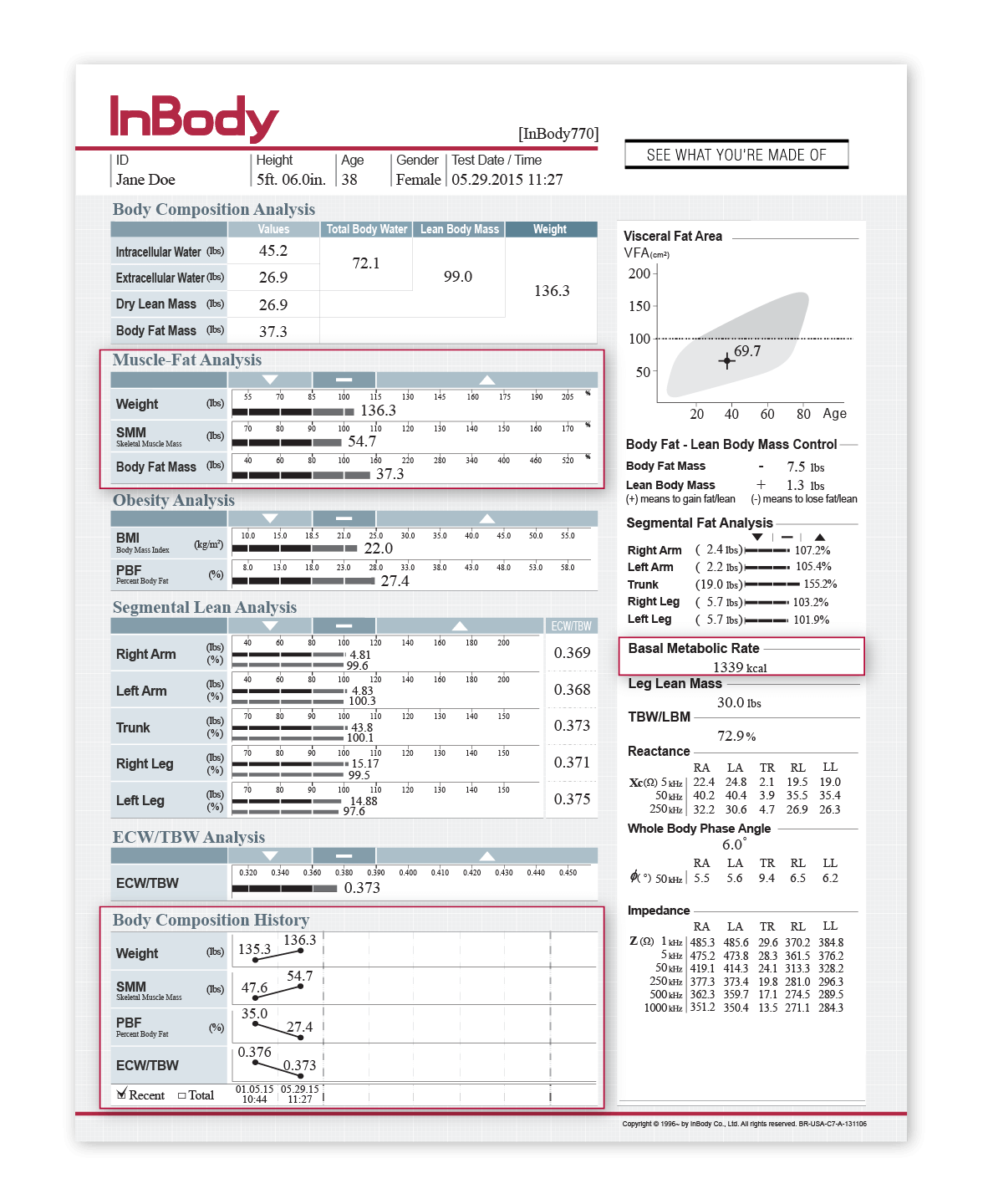
Rising obesity rates increase the risk of health conditions such as diabetes or cardiovascular disease. However, what most don’t realize is that obesity isn’t the only link with poor health conditions- factors such as low muscle mass can also predispose disease risk. Nutrition is a major factor in health promotion and therefore a proper nutrition program for medically “at-risk” populations helps manage these risks effectively. While outward appearances might provide some prognostic value, tracking and analyzing body composition changes offers a more comprehensive representation of a client’s health and health risk.
Simple health risk assessments such as BMI cannot differentiate between fat mass and muscle mass. InBody supplies dietitians with a Muscle-Fat Analysis that shows the balance between the muscle and fat compartments and the health risk associated with an imbalanced composition. Poor food choices might not display outwardly but with this comparison, nutritionists can identify those clients with a high amount of fat mass when compared to overall weight. Through the adoption of better eating habits and proper nutrition, these clients can start to reverse the amount of fat mass, reducing general health risk.
Visceral fat is another primary contributor to increased risk of health conditions such as diabetes, cardiovascular disease, and certain cancers. Resulting from excess intake of sugar, processed foods, and alcohol, this highly metabolic type of fat can be reduced through a controlled diet, reducing disease risk. With the ability to monitor body composition parameters including muscle mass, body fat mass, and visceral fat, dietitians can set more effective nutrition plans geared towards reducing disease risk over time.
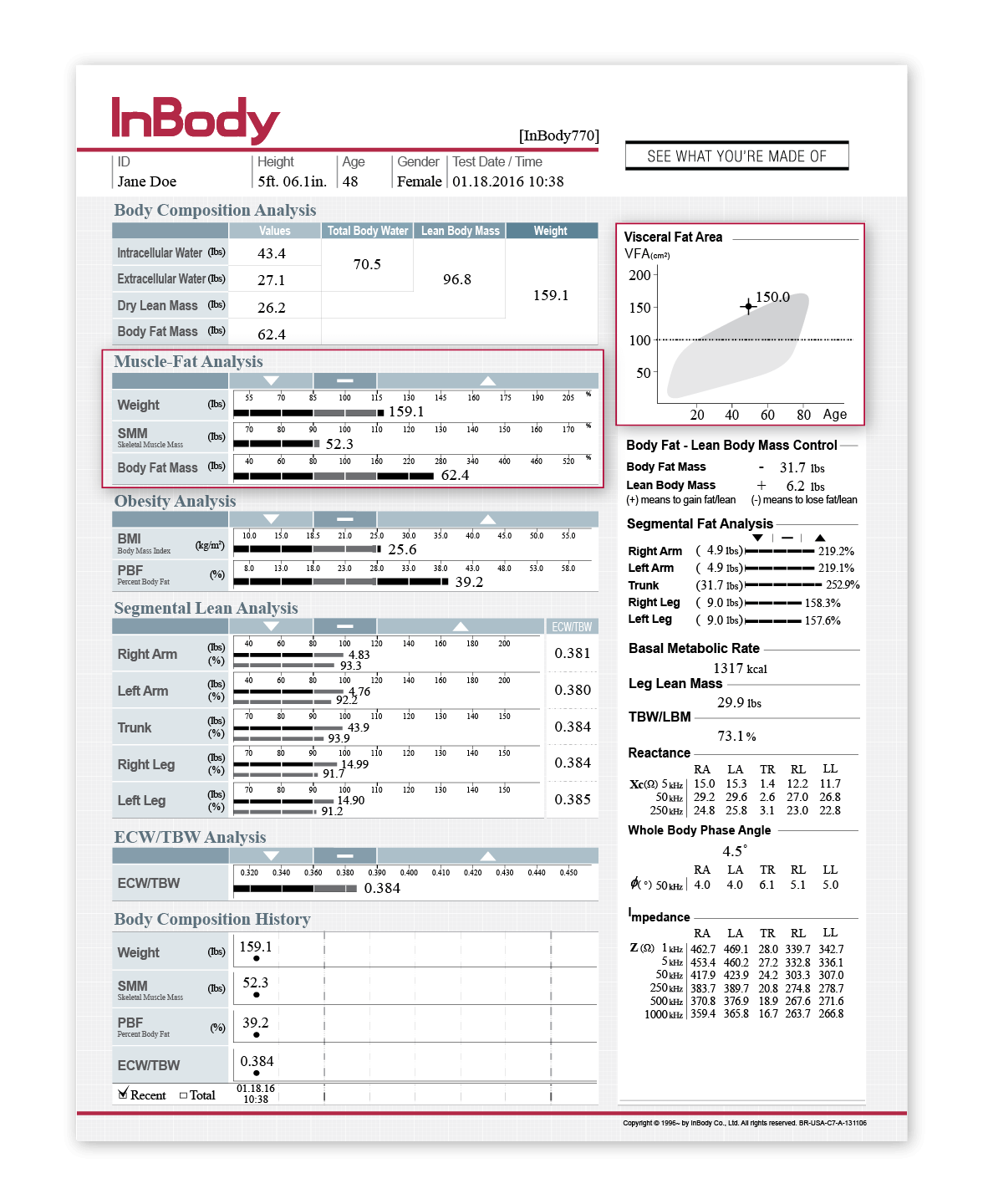

 DIRECT SEGMENTAL MEASUREMENT (DSM)
DIRECT SEGMENTAL MEASUREMENT (DSM)Direct Segmental Measurement (DSM) measures water, muscle mass and fat mass in the body in five segments: Right Arm, Left Arm, Right Leg, Left Leg and Trunk. By measuring each segment of the body separately, InBody provides an in-depth analysis of the patient’s muscle-fat and fluid balance in each segment independently. Identifying the patient’s lean and fat distribution allows a better assessment of associated health risks while segmental ECW/TBW can be used to identify systemic or localized inflammation resulting from injury, underlying health conditions or surgical complications.
 MULTIPLE FREQUENCIES
MULTIPLE FREQUENCIESInBody devices utilize multiple frequencies to measure body water more accurately. These high and low frequencies measure both intracellular and extracellular water, producing precise measures of each body water compartment. With accurate fluid measures, InBody can be used to identify fluid imbalances or water retention stemming from inflammation or injury as well as monitor changes resulting from exercise interventions and recovery.
 8 POINT TACTILE ELECTRODES
8 POINT TACTILE ELECTRODESInBody uses an 8-Point Tactile Electrode system to ensure that measurements always start in the same place, test after test. This technology creates precise and reproducible results, ensuring that the results obtained are a direct outcome of clinical recommendations and interventions, rather than error.
 NO EMPIRICAL ESTIMATIONS
NO EMPIRICAL ESTIMATIONSInBody does not rely on empirical estimations based on age, gender or ethnicity to predict results. With the high level of accuracy and precision achieved with the aforementioned technological advancements, InBody removes population-associated assumptions when determining body composition to ensure results are based solely on the individual, increasing sensitivity to the individual’s unique makeup of muscle and fat, enabling effective tracking of changes.

